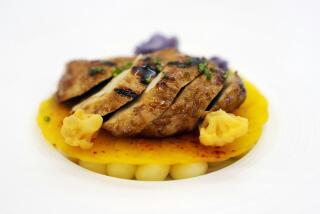Hunt-Wesson Seeks Tougher, Tastier Tomato : Genetics: Fullerton processing giant agrees to finance bioengineering efforts by a London chemical firm.
FULLERTON — They cringe at talk of mutant tomatoes, but executives at Hunt-Wesson Inc. are up to their elbows in plans to use genetic engineering to make the fruit--which they pulp, puree, dice, slice, can and bottle--taste and travel better than ever.
On Thursday, Hunt-Wesson and Imperial Chemical Industries PLC in London signed an agreement calling for the Fullerton tomato-processing giant to finance a multi-year effort by ICI’s U.S. research arm in Wilmington, Del., to create a better-processing tomato.
Separately, ICI said it has signed an agreement under which Dole Fresh Vegetables Inc. in Salinas will review ICI’s technologies for improving the flavor and quality of tomatoes grown for the fresh-fruit market.
The Dole Food Co. subsidiary, based in Westlake Village, will also evaluate methods of applying ICI’s technology to other fresh fruit and vegetable products, a company spokeswoman said.
While that agreement simply gives Dole the right to take a look at ICI’s proprietary processes, the pact with Hunt-Wesson is a full-fledged development agreement.
Because tomatoes for processing are picked ripe and shipped long distances, one goal is to create a firmer fruit that has less tendency to soften on the vine or after being picked and is better able to withstand the rigors of shipping without breaking.
In other words, a tougher tomato.
But along with a thick skin and more meat, Hunt-Wesson officials want a tastier tomato, spokeswoman Kay Carpenter said.
Hunt-Wesson, the world’s largest manufacturer and retailer of tomato products, thinks that the first crop of genetically improved tomatoes could be used in its products as early as 1995, she said.
The agreement calls for Hunt-Wesson to finance the program, to be conducted by scientists and researchers at ICI Americas Inc. Hunt-Wesson would not disclose the cost of the program, and officials at ICI could not be reached for comment.
Carpenter said ICI has been experimenting with so-called bioengineered tomatoes for years. “They have brought us their previous work, and we have agreed to fund more development. What they are doing in the lab--using genetic material and test tubes--is not anything different than would be done in a typical seed cross-breeding program in the fields,” she said. “They are just accelerating things.”
ICI’s plans for a bionic tomato are nothing new. In 1989, a U.S. patent was issued to a Davis company, Calgene, for a process to alter the gene that governs when tomatoes begin to rot. Calgene completed its application for the patent in October, 1986, a month before ICI submitted its own application for a process to alter the same gene.
Last week, ICI filed a challenge to Calgene’s patent.
The plant engineering industry received a major boost in June, when the U.S. Food and Drug Administration said it would review genetically engineered foods under the same criteria it uses for other food products.
ICI, which started its U.S. unit in October, 1991, has been involved in plant biotechnology research for more than 15 years. In 1983, the company began collaborating with one of the fruit biology laboratories at the University of Nottingham in England and subsequently has developed a portfolio of 12 specialized genes that control the ripening properties of various fruits and vegetables.
Since 1989, ICI has been working with Petoseed of Saticoy, Calif., a leading tomato seed company.
More to Read
Inside the business of entertainment
The Wide Shot brings you news, analysis and insights on everything from streaming wars to production — and what it all means for the future.
You may occasionally receive promotional content from the Los Angeles Times.








